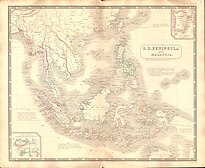 Javanese women in Malay Peninsula, circa 1910. | |
| Regions with significant populations | |
|---|---|
| Nationwide | |
| Languages | |
| Predominantly Malay (Malaysian Malay) | |
| Religion | |
| Predominantly Sunni Islam | |
| Related ethnic groups | |
Indonesian diaspora
|
| History of Malaysia |
|---|
 |
|
|
The Indonesian Malaysians (Malay/Indonesian: Orang Malaysia Keturunan Indonesia) are Malaysian citizens of Indonesian ancestry. Today, there are many Malaysian Malays who have lineage from the Indonesian archipelago and have played an important role in the history and contributed to the development of Malaysia, they have been assimilated with other Malay communities and are grouped as part of the foreign Malays or anak dagang in terms of race.[1] The Malaysian census does not categorize ethnic groups from the Indonesian archipelago as a separate ethnic group, but rather as Malay or Bumiputera.[2][3]
Article 160 of the Malaysian Constitution only states the criteria for a person to be considered a Malay; which is to profess the religion of Islam, habitually speak the Malay language, conform to Malay custom and be born to a Malaysian parent.[4]
Several ethnic groups of Indonesian origin such as Acehnese, Minangkabau, Javanese, Banjarese, Mandailing[5] and Bugis have significant migration to Malaysia and form significant communities in Malaysia.[6][7] Negeri Sembilan, in particular, has large numbers of Minangkabau, Acehnese in Kedah, Javanese in Johor, Banjar in Perak and Bugis in Selangor and Sabah. There are three kings and six prime ministers of Malaysia who also have ethnic lineage from the Indonesian archipelago, such as the kings of Johor and Selangor who have Bugis lineages, and king of Negeri Sembilan who have Minangkabau lineages. Malaysia's former first king Tuanku Abdul Rahman,[8] Najib Razak, and Muhyiddin Yassin, each of them have Minangkabau, Bugis, and Javanese ancestry.[9][10]
- ^ Clark, Marshall; Pietsch, Juliet (18 March 2014). Indonesia-Malaysia Relations: Cultural Heritage, Politics and Labour Migration (Media, Culture and Social Change in Asia Series). Routledge. p. 11. ISBN 978-0-415687-52-2.
- ^ Gulrose Karim (1990). Information Malaysia 1990–91 Yearbook. Kuala Lumpur: Berita Publishing Sdn. Bhd. p. 74.
- ^ "Telaah: Kisah Orang Jawa yang tak jadi bagian dari Melayu". Antaranews.
- ^ "Bumiputera: Are you one? Or can you 'become' one in Malaysia?". Malay Mail. 2017-07-26. Retrieved 2022-12-11.
- ^ "Ketika warga Malaysia keturunan Mandailing ramai-ramai 'pulang kampung' ke Indonesia". BBC Indonesia.
- ^ Suad Joseph; Afsaneh Najmabadi (2006). Economics, Education, Mobility And Space (Encyclopedia of women & Islamic cultures). Brill Academic Publishers. p. 436. ISBN 978-90-04-12820-0.
- ^ "Indonesia-Malaysia, Serumpun Beda Nasib". VIVA. 7 September 2009.
- ^ Teguh Gunung Anggun. "Orang-Orang Minang Berpengaruh di Kancah Dunia". Sumbarprov.
- ^ A.Syalaby Ichsan. "Banyak Orang Indonesia Jadi Menteri di Malaysia". Republika.
- ^ Haris Barak (March 2020). "Pengakuan PM Malaysia Muhyiddin Yassin: Bapak Bugis, Ibu Jawa". Liputan6.
